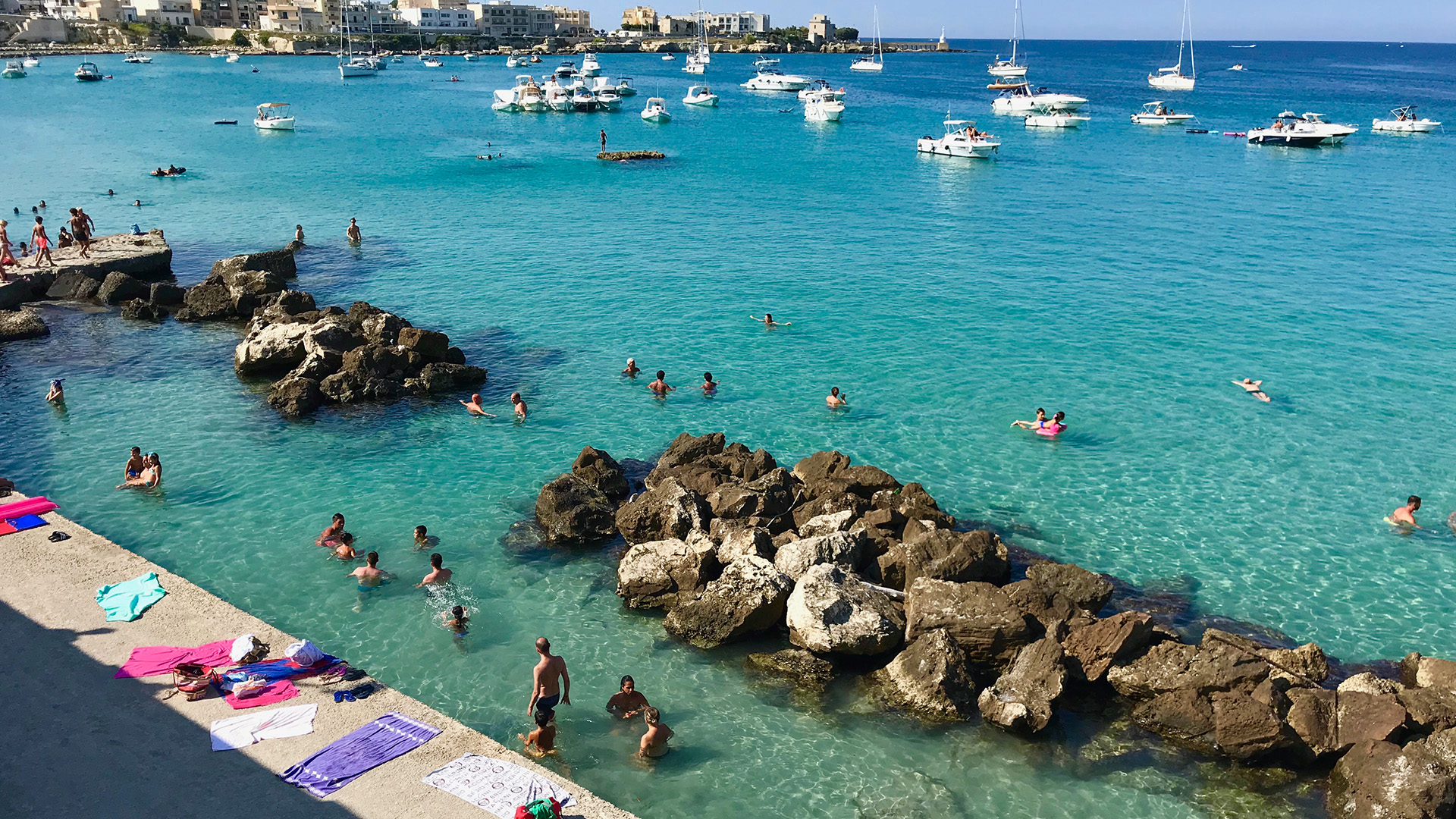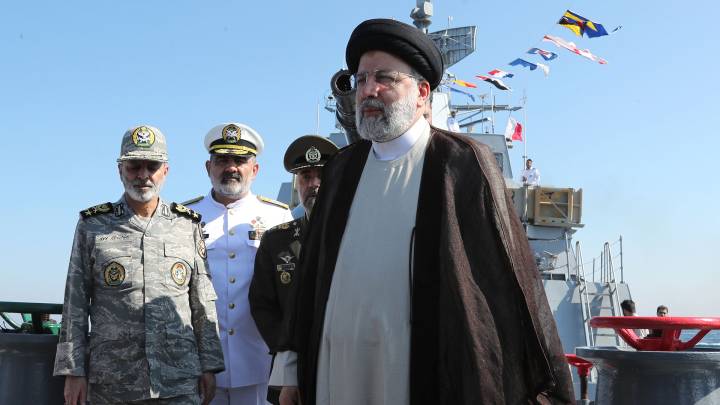For a long time, the Mediterranean was a battleground exclusively for European and other Western powers. These days it is becoming crowded.
Otranto can boast to be one of Italy’s most gracious towns. While the Salento beaches are hopelessly crowded during Ferragosto, when Italians celebrate the Assumption of the Virgin Mary, you can enjoy an undisturbed spell on Otranto’s historic city walls—or even cool off in the turquoise water of its harbour.
Over the course of centuries fine white sand has been deposited, the reason why only small sailing and fishing boats are mooring here. The bones of the 800 odd martyrs who were massacred by the Ottoman navy in Otranto a long time ago have also found themselves a resting place, just a little further up in the old town.
In 1480 Sultan Mehmed the Conqueror sent a squadron from Albania out across the Adriatic in order to lay siege on Otranto. The Christian inhabitants, among them an archbishop, made a stand against these forces and, having conceded their defeat, resisted a forced conversion to Islam. This is according to Christian lore. The outcome of this confrontation can be found in the Basilica Santa Annunziata in Otranto, haphazardly piled up behind panes of glass.
Piles of skulls and bones. The number 800 stands for ‘Omega’ and could also be of symbolic and salvific value. For the Catholic Church, these martyrs remain highly topical. The presumed motive of this massacre, odium fidei, could be translated as a hate crime. Pope Benedict XVI recognised them as victims of persecution of Christians. And his successor Pope Francis canonized the slayed Otrantians in 2013.
To this day, historians continue to puzzle over what Mehmed II actually wanted in Otranto. Others think that, as the invader of Byzantium and thus successor to the Roman Emperors, he now wanted to seize the Eternal City and therefore had his fleet cross over to Apulia. But then Mehmed died. And King Ferrante (Ferdinand I) of Naples chased the Ottoman marines back to where they had come from.
The story of the Turks at Vienna (1683) has remained present in the European historical memory to this day; Mehmed’s Italian adventure less so. When we picture the Ottoman forces of yore, we imagine them more on land than at sea. Archers on horseback and sabre-swinging Janissaries, cannoneers crumbling city walls with their mighty guns. Not too many thoughts are usually spared for the Ottoman navy. Nonetheless, its admirals have led some notable amphibious campaigns. In the 16th century, the Sublime Porte even formed a maritime alliance with France against the Habsburg monarchy.
I am not overly worried that anytime soon we would be forced to watch another hostile Turkish disembarkation in Otranto's port. I also doubt that everything that Erdoğan does has its parallel in Ottoman history. The constant use of ‘neo-Ottoman’ in analyses is cheap; and besides, one has to look rather back into the early days of the Turkish Republic to understand today’s conflicts, not to the Ottomans. But that’s a topic for another day.
However, reading about current events in the Mediterranean, I cannot help but think of Otranto every so often. I have the impression that it is hard for most Europeans, even among the political decision-makers, to grasp the ongoing shifts of power in the Mediterranean.
In recent decades, the mare nostrum was almost exclusively a theatre of European naval politics. Even those Western states without Mediterranean shores, first and foremost the US Navy, have been steaming blithely between Valencia and İskenderun as if it were their garden pond. But when have we ever seen Turkish, Syrian, or Algerian frigates cruising off the Balearic beaches?
Our view of the Mediterranean is mainly conceived from the North. Even the Soviet Union could not change this image. It failed in dropping anchor on NATO’s Southern flank during the Cold War. Now, however, Russian forces stand in Libya and Syria. And they seem to follow an unswerving course towards Algeria, Egypt, and the West Balkans to pursue a strategic set of Mediterranean Sea policies.
Tensions are currently flaring up again in the eastern Mediterranean as Turkey resorts to gunboat diplomacy in an attempt to renegotiate maritime borders and economic zones. Currently Turkey, which has concluded an agreement with the Libyan Government of National Accord, is being challenged by Greece, Cyprus, Egypt, and Israel.
Ankara has identified the Mediterranean as a playing field and claims the role of a veritable maritime power, one which is independent of the international legal positions on exclusive economic zones. Using just a few frigates and anti-aircraft weapons, Turkey closed the skies over Tripoli at the beginning of the year, pushed back the troops of Field Marshal Khalifa Haftar and his allies, changing the course of war in Libya for good.
The Turkish government would not consider this at all hubristic: Turkey has, ultimately, always been a Mediterranean power. (We Germans ought to know this. After all, we delivered the warships Goeben und Breslau to the Ottoman Navy in 1914, hoisted up the Crescent flag and sent them all guns blazing against the Entente. This undoubtedly accelerated the fall of the Ottoman Empire alongside the German one.)
Meanwhile, even the Gulf states are showing their face at Europe’s southern shores. Recently, the United Arab Emirates sent fighter jets to joint manoeuvres with the Greeks in the Aegean, presumably just to annoy the Turks. We might soon see Israeli-Emirati naval exercises to deter the Sea Peoples of today.
Kilo-class Iranian U-boats will likely crop up south of Crete from time to time. And who knows what the Chinese have in store for shores of Orange blossom and Jasmine. Algeria’s navy continues to be upgraded. Egypt’s fleet has also just received the latest submarine from ThyssenKrupp. The head of Lürssen-Werft, Germany’s flagship U-boat supplier, was personally received by President Abdel-Fattah Al-Sisi in August 2020. Having these sorts of arsenals—well, you would hope to use them somehow.
It all gets a bit more crowded and confusing in the area where the Mistral and Meltemi blow. And this unfolds at a time when the European Union’s centre of gravity could edge further towards the Mediterranean Sea, with an unfortunate British departure. The Mediterranean will most probably continue to be militarised.
Natural gas seems to be an excuse for geopolitical adventures, rather than the principal reason. Old players return, new ones join them. The rather long-lasting era during which the Mediterranean Sea was felt to be the exclusive playing field of European and American power, seems to be drawing to a close.
We probably won’t see Austria’s proud royal-imperial navy anytime soon off Istria and Dalmatia. Everything else seems to be uncertain. Old Arabic and Ottoman maps refer to the Mediterranean as the ‘white sea’ (Al-bahr al-abyad) or Akdeniz - until today. From a present point of view, this must have been meant ironically.





